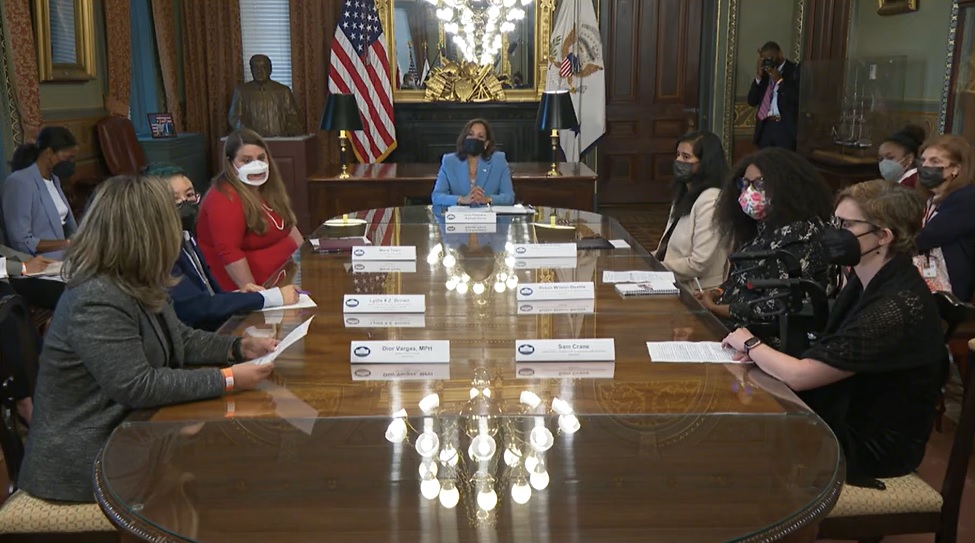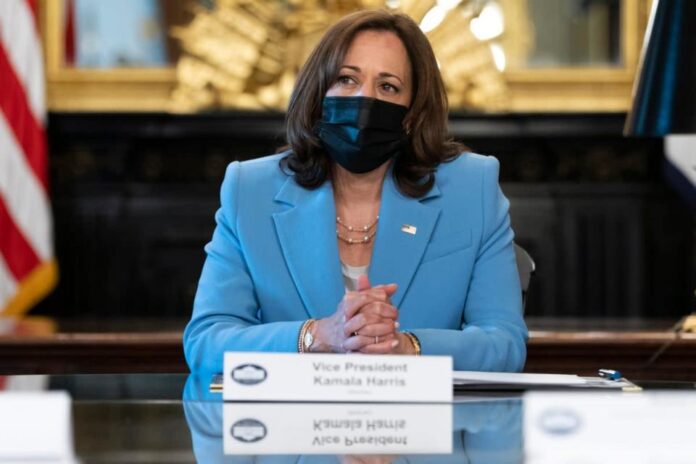On the 32nd anniversary of the signing of the Americans with Disabilities Act (ADA), which fell on July 26, 2022, Vice President Kamala Harris hosted a roundtable discussion with leading disability advocates. The conversation included a focus on health care disparities among the disability community, the largest minority group in America.
Seated at the head of the table in her ceremonial office, the Vice President used the opportunity to address how new abortion restrictions, ignited by the recent overturning of Roe v. Wade, disproportionately impacts Americans with disabilities, as previously reported by AmeriDisability. In June 2022, the Supreme Court issued an opinion that reversed the 5-decade-old decision that protected access to abortion on the federal level. Meaning that now it is up to each of the 50 states to individually enact and enforce laws related to this type of care. Thirteen states had so-called “trigger laws” on the books that then promptly banned abortion following the controversial opinion announcement.
Participants in the disability roundup discussion included: Lydia Brown, President and CEO at Autistic Women and Nonbinary Network; Sam Crane, Legal Director at Quality Trust for Individuals with Disabilities; Maria Town, American Association of People with Disabilities; Dior Vargas, Disability Rights and Mental Health Advocate; and Robin Wilson-Beattie, Disability Sexual and Reproductive Health Educator.

Vice President Harris offered statistics that illustrated how people with disabilities are more so impacted by the reversal than other individuals. She noted that women with disabilities have higher rates of sexual violence, increased risk of pregnancy complications, and added difficulty in traveling to and receiving reproductive care; in addition to an increased likelihood of poverty and mobility challenges.
“So these statistics point out the direct impact of the Dobbs decision and the potential impact, but also speak to a larger issue, which is the disparities that still continue to exist in our country as it relates to access for people with disabilities in America,” Vice President Harris declared.
Representing each of their organizations, discussion participants offered additional dialogue regarding how people with disabilities face undue barriers as it relates to reproductive health care and abortion access. And, more than three decades after the ADA’s signing, the participants also attested that equal opportunity gaps largely remain. Much progress still needs to be made in support of people with disabilities in all areas of public life, including employment, schools, transportation, and accommodations in public and private places.
The Vice President acknowledged these staggering issues in her opening remarks. “We still have a lot of work to do in our country as it relates to fulfilling the promise of the ADA. When we look at the issue of access to reproductive care, it is but one example of many where the disparities still exist as it relates to people in our country who have disabilities and deserve to have equal access.”
Vice President Harris also stressed that the current Administration is committed to fighting to protect reproductive rights, and she shared how the Administration will further advocate for the bodily autonomy and self-determination of all individuals, including those with disabilities.
“I also believe that this is an important conversation to have in furtherance of what we’ve been advocating for, which is the coalition building that must take place to strengthen the movement that we are in right now to fight for reproductive care for all people in our country,” she said.
The disability roundtable discussion was live streamed on the Vice President’s social platforms (replay here), and included ASL interpretation for the Deaf and hard-of-hearing community. You can read the full transcript of Vice President Harris’ disability roundtable opening statement by clicking here.
What other disability-related issues do you want the Administration to address?






